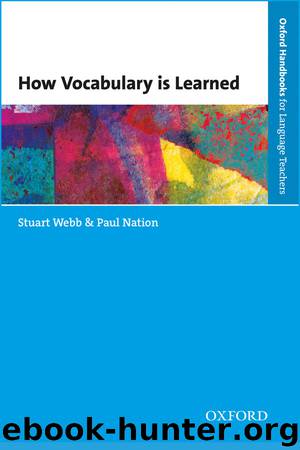How Vocabulary is Learned (Oxford Handbooks for Language Teachers) by Stuart Webb & Paul Nation

Author:Stuart Webb & Paul Nation [Webb, Stuart]
Language: eng
Format: azw3
ISBN: 9780194403528
Publisher: Oxford University Press
Published: 2017-06-05T16:00:00+00:00
This can be done in pen-and-paper format, or using online polling software such as Poll Everywhere if the resources are available (see Website references). Online surveys allow students to answer questions and give feedback anonymously in real time via smartphones, computers, and tablets. Responses can be seen live by everyone in the class. Multiple-choice and open-ended questions can be used, with the answers displayed as percentages for multiple-choice questions and lists of responses for open-ended questions. Surveys allow teachers to check different aspects of their students’ learning experience, and enable students to provide regular feedback about what they are doing in a non-threatening way. Moreover, by including students in regular discussion of their vocabulary learning, they may become more engaged in the learning process.
One challenge of teaching large classes is that proficiency levels may vary widely. There are several ways in which teachers can deal with this:
Place students into sub-groups according to level. In this case, appropriate tasks can be designed for students at each level to enhance vocabulary learning. The advantage of this approach is that completion of a task should indicate some degree of learning.
Place students in mixed-ability groups to allow more advanced students to provide support for their less advanced peers. In essence, this is a form of cross-proficiency peer teaching: students working at a higher level provide teaching support to those at lower levels. The advantage of this approach is that more advanced students can take on a larger role in the task and less advanced students can receive individualized support. The disadvantage is that less advanced students may rely on their more capable partners to complete tasks. So teachers need to carefully monitor the progress of all students.
Include a lot of independent activities that allow students to work at their own level. Reading activities, writing activities, flashcards, presentations, and extensive viewing are all examples of vocabulary learning activities that work well for independent study. A particularly good example is the spoken journal, where students record themselves rather than write; this allows them to use the vocabulary that they know and have recently learned to develop their productive vocabulary knowledge. As students are working on their own, teachers can move around and provide support when it is needed. The disadvantage of independent study is that it may take time for teachers to develop a sufficient number of resources for students at varying levels. Ideally, activities and tasks should be developed and pooled together among all teachers involved in the programme. If a number of teachers are working on developing resources for students at different levels, then it may not be long before there are enough to cater for a range of proficiency levels.
Download
This site does not store any files on its server. We only index and link to content provided by other sites. Please contact the content providers to delete copyright contents if any and email us, we'll remove relevant links or contents immediately.
Cecilia; Or, Memoirs of an Heiress — Volume 1 by Fanny Burney(32434)
Cecilia; Or, Memoirs of an Heiress — Volume 2 by Fanny Burney(31869)
Cecilia; Or, Memoirs of an Heiress — Volume 3 by Fanny Burney(31852)
The Lost Art of Listening by Michael P. Nichols(7406)
Asking the Right Questions: A Guide to Critical Thinking by M. Neil Browne & Stuart M. Keeley(5632)
We Need to Talk by Celeste Headlee(5542)
On Writing A Memoir of the Craft by Stephen King(4863)
Dialogue by Robert McKee(4321)
Pre-Suasion: A Revolutionary Way to Influence and Persuade by Robert Cialdini(4144)
I Have Something to Say: Mastering the Art of Public Speaking in an Age of Disconnection by John Bowe(3840)
Elements of Style 2017 by Richard De A'Morelli(3306)
The Book of Human Emotions by Tiffany Watt Smith(3237)
Fluent Forever: How to Learn Any Language Fast and Never Forget It by Gabriel Wyner(3028)
Name Book, The: Over 10,000 Names--Their Meanings, Origins, and Spiritual Significance by Astoria Dorothy(2939)
Good Humor, Bad Taste: A Sociology of the Joke by Kuipers Giselinde(2903)
Why I Write by George Orwell(2874)
The Art Of Deception by Kevin Mitnick(2735)
The Grammaring Guide to English Grammar with Exercises by Péter Simon(2706)
Ancient Worlds by Michael Scott(2622)
